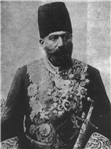
Mirza Mohammad Hasan Khan E`temad os-Saltaneh
Mirza Mohammad Hasan Khan (1843-96) was one of the prominent courtiers during the reign of Naser od-Din Shah and an important personality in the areas of publishing and translation in Iran over the second half of the 19th century. Born into an upper class family, he was one of the first students to attend the polytechnical school Dar ol-fonun in Tehran. After holding several military ranks and offices from an early age, in 1861-2 he left Iran for Paris where he served in the Iranian embassy and completed his formal education, developing his mastery of French. From the time he returned to Iran in 1867-8, Mirza Hasan Khan was at the center of government in Iran, the place where he would remain for the next twenty-nine years until his sudden death a few months prior to the assassination of Naser od–Din Shah in 1896. He held a variety of official positions in the course of his career in government, one of the more notable ones being that of the private reader of foreign books and newspapers for the shah. As an intimate member of the court, he accompanied the shah on many of his journeys inside and outside Iran. He was given responsibility for the government printing office and the Bureau of Translation in 1871, and he headed both of those until his death. He gained recognition from international organizations such as the Geographical Society of Paris and the Asian societies of France, Britain, and Russia. Mohammad Hasan Khan was one of the more prolific authors of the Naseri era. His works consist primarily of histories, chronicles, and translations. Some of his more notable works are Mer‘at ol-boldan, Al-ma’aser va al-asar, and Tarikh-e montazam-e Naseri. Perhaps his most influential writing has been his well-known Ruznameh, or diary, which he secretly kept over many years. That constitutes one of the important and unique primary sources in 19th century Iranian history.
Foreword
Introduction
The Rapture, or The Book of Sleep Beginning
The Beginning of Aqa Mohammad Shah Qajar’s Discourse
The Interrogation of Haji Ebrahim Khan Shirazi
The Interrogation of Mirza Shafi‘ Mazandarani
The Interrogation of Haji Mohammad Hosayn Khan Sadr Isfahani
The Interrogation of Mirza Abu al-Qasem Qa’em Maqam Farahani
The Interrogation of Haji Mirza Aqasi
The Interrogation of Mirza Taqi Khan Amir Kabir
The Interrogation of Mirza Aqa Khan Nuri
The Interrogation of Mirza Mohammad Khan Sepahsalar
The Interrogation of Mirza Hosayn Khan Sepahsalar
The Interrogation of Mirza Yusuf Ashtiani (Mostowfi ol-Mamalek)
The Interrogation of Mirza ‘Ali Asghar Khan Atabak (Amin os-Soltan)
Glossary of Terms
Appendix
Bibliography
Index